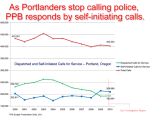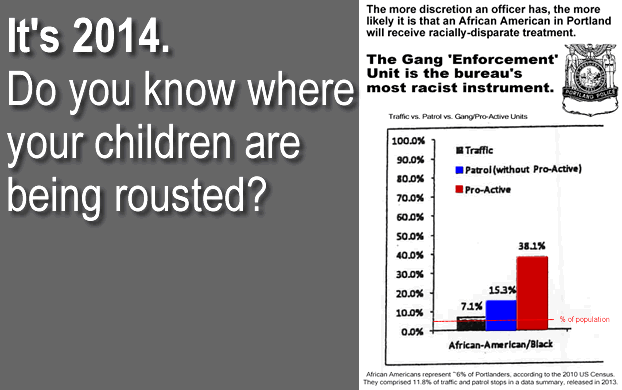When cops want City Hall to approve of some shenanigans, we often see the Chief’s request portrayed as if it arises from our Human Rights Commission through a subcommittee that Roger David now styles the ‘Police Community’ Relations subcommittee. As with most of the Chief’s public/police interfacing, the CPRC posts no minutes.
On 19 June, we took this testimony to the CPRC. At issue are updates to a 2009 Police Plan to Address Racial Profiling, legislation we helped pass. Five years on? Only police hiring provisions have been carried out. We (again) suggested this body begin the work. We proposed strategies for engaging in broader community. We believe setting public expectations - that policing will change - is instrumental to reforming illegal conduct.
Because we know: the City plans to skew racial demographics.
We can only hope broader community involvement addresses the proposed ‘whitening’ of traffic stop data. A broad application of justice requires folks with sophisticated knowledge of arcane statistical practices (like ‘aggregating racial data’) to now step up. Hispanics may be migrating to ‘white’ when self-identifying, but cops still abuse them as if they are not.
At the June CPRC meeting, a half-dozen cops presided, collecting overtime, no doubt. Of the ‘community’ represented? Only three members then seated are not currently compensated by the City, for either their jobs or contracts they’ve solicited. Of those public members, probably two have retired from City jobs.
We pointed out Strategies 2-5 – elements most likely to change police culture –have never been implemented. In the interim since 2009, police hired PSU Professor Renauer’s Criminal Justice Policy Research Institute, to both shape public opinion and propose any other conceivable benchmarks beyond census data … to ‘prove’ cops aren’t discriminating against people of color.
The People are being out-maneuvered.
Police inoculate themselves from accusations of wrongdoing.
Chief Reese wants his CPRC to take the lead in data collection strategies, to track ‘stop ‘n frisk,’ and their more violent encounters. This nearly invisible band has never taken on a task so important, or so complex. You can be assured … if police remain in charge of collecting data which establishes misconduct, they’ll find themselves blameless. They’ll devise strategies that leave us without the facts necessary to make such a case.
The failure of the City to meaningfully track racial profiling led to obstruction of justice. Without the ‘right’ data, DoJ Investigators were in 2011 unable to establish to what degree Portland Police engage in race-based policing. The City agreed to collect the ‘right’ data in 2012, and now balks: they want no Federal court to look in on annual progress over an initiative they’ve studiously neglected.
Who does the best job of designing data collection protocols?
Instead of employing folks who’ve spent their life studying and practicing it, the City relies ever
more on police for assessment of need and delivery of social services. Wednesday’s council agenda will hand
police $3,500,000, to let contracts with service providers, assuring criminality as a precursor
to restorative care.
From housing to chemical dependency treatment, the City now uses cops to decide who gets help. As calls on police services decline, in tandem with decreases in criminal activity, the City conspires to find new ways to keep an over-sized force in jobs.
Cops are not health care providers. Nor are they data analysts or software designers. To let them call the shots, designing programs which track their conduct, is another in an increasing array of responsibilities local authority shifts to police. We have better choices than ask the perpetrators of human rights abuses to be project leaders in this task.
It was gratifying to read Denis C. Theriault almost simultaneously revealed another element of City corruption wholly pertinent to this conversation. See his Portland Mercury article, “Cops No Longer Publicly Tracking Use of Force Against ‘Transients.'” Those who read our testimony will understand that, only with broader community input, will The People begin to exercise the civil authority necessary to assure our 14th Amendment protections.
If you know of any with the skill sets required to do this complex work, we suggest you inform Portland City Council.


Theriault explains the pain-compliance methods we see their subcontractors using. This is not an upgrade from oppression, Judge Simons. I am praying this judge is as smart, honest, ethical and savvy as he comes across. He appears to see right through them, but we keep seeing our attempts to rein in the police get lip service but zero direct action by the enabling Council Members. We must find a way.
Pingback: A Sign of Things to Come? | Consult Hardesty
Pingback: United Notions…. | Tim's Blog